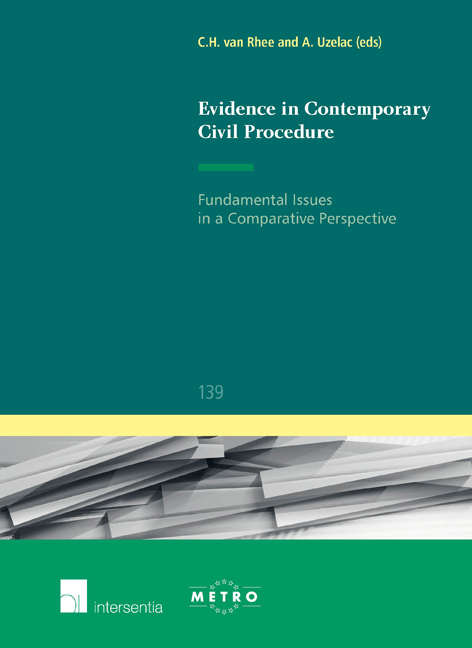Book contents
- Frontmatter
- Contents
- List of Authors
- Acknowledgements
- INTRODUCTION
- FUNDAMENTAL AND OTHER PRINCIPLES OF EVIDENCE IN CIVIL LITIGATION
- TYPES OF EVIDENCE IN CIVIL LITIGATION
- EVIDENCE IN ARBITRATION AND NATIONAL CIVIL LITIGATION
- EVIDENCE: LEARNING FROM ARBITRATION
- EVIDENCE IN CIVIL PROCEDURE IN THE NETHERLANDS: TRADITION AND MODERNITY
- TAKING OF EVIDENCE IN CROATIAN APPELLATE COURTS: WHY NO FACT-FINDING AT SECOND INSTANCE?
- EVOLUTION OF THE POWERS OF THE JUDGE AND THE POWERS OF THE PARTIES REGARDING THE TAKING OF EVIDENCE IN SOUTH AFRICA
- REGISTRAR
- EVIDENCE IN CROSS BORDER CIVIL LITIGATION
- IUS COMMUNE EUROPAEUM
EVIDENCE: LEARNING FROM ARBITRATION
from EVIDENCE IN ARBITRATION AND NATIONAL CIVIL LITIGATION
Published online by Cambridge University Press: 15 December 2017
- Frontmatter
- Contents
- List of Authors
- Acknowledgements
- INTRODUCTION
- FUNDAMENTAL AND OTHER PRINCIPLES OF EVIDENCE IN CIVIL LITIGATION
- TYPES OF EVIDENCE IN CIVIL LITIGATION
- EVIDENCE IN ARBITRATION AND NATIONAL CIVIL LITIGATION
- EVIDENCE: LEARNING FROM ARBITRATION
- EVIDENCE IN CIVIL PROCEDURE IN THE NETHERLANDS: TRADITION AND MODERNITY
- TAKING OF EVIDENCE IN CROATIAN APPELLATE COURTS: WHY NO FACT-FINDING AT SECOND INSTANCE?
- EVOLUTION OF THE POWERS OF THE JUDGE AND THE POWERS OF THE PARTIES REGARDING THE TAKING OF EVIDENCE IN SOUTH AFRICA
- REGISTRAR
- EVIDENCE IN CROSS BORDER CIVIL LITIGATION
- IUS COMMUNE EUROPAEUM
Summary
General
As is generally known, there are major differences between the fact-finding processes of arbitration and litigation proceedings. This is not only true from a civil law, but also from a common law perspective: Today's practice with respect to the taking of evidence in arbitration proceedings results from a combination of approaches of lawyers with different backgrounds, in particular, from lawyers from civil and common law jurisdictions. In particular, this combination of approaches is reflected in the International Bar Association Rules on the Taking of Evidence in International Arbitration. Different from many other ‘principles’, ‘rules’ etc. which only play a role in the discussion of academic or practitioners’ conferences, these rules have gained significant acceptance in arbitration practice and serve as guideline for the decision of fact-finding issues in many arbitration proceedings all over the world today.
The reason for asking about what litigation can learn from arbitration with respect to evidence-taking is obvious. Arbitration is market-made and, therefore, concepts developed in arbitration practice and accepted by parties and arbitration practitioners might be effective and user-friendly. Therefore, one might argue that arbitration could be a laboratory for best practices in civil procedure not only, but also when it comes to evidence. I do not suggest that, therefore, arbitration is superior to litigation. As is generally known, not all results of market-driven processes are in the best interests of all stakeholders. This contribution, however, is not about criticizing arbitration practice where there might be shortcomings, but simply asks which lessons can be learnt from arbitration with respect to evidencetaking.
My approach is, of course, based on my personal experience resulting from my academic and practical work in civil procedure in the German speaking countries on the one hand and in international commercial arbitration on the other. Therefore, some of the aspects which I will address where litigation might learn lessons from arbitration are based on my ‘Germanic’ litigation experience and might, therefore, not apply to the civil procedure of other jurisdictions to the same extent. Moreover, I would like to clarify that user-friendliness and efficiency, of course, are not necessarily the only relevant factors for identifying the best approaches in the field of evidence – it is just one very important perspective, and it is the one perspective which I will focus on in the following.
- Type
- Chapter
- Information
- Evidence in Contemporary Civil ProcedureFundamental Issues in a Comparative Perspective, pp. 243 - 256Publisher: IntersentiaPrint publication year: 2015



